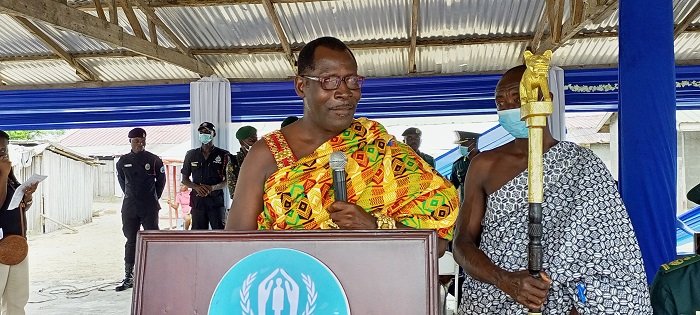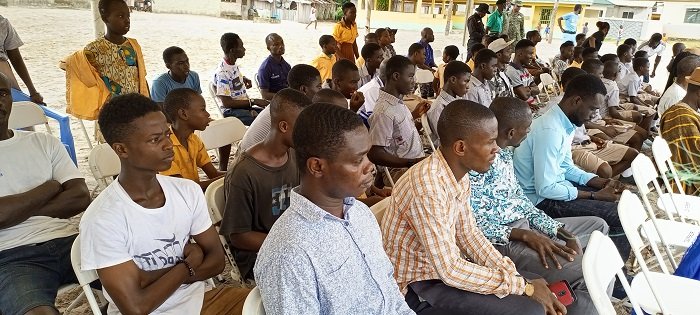News
Ellembelle chief calls for sustainable livelihoods for repatriated refugees

Chief of Ampain in the Ellembelle District of the Western Region, Nana Nyameke Fofole II, has called on United Nations (UN) Systems to ensure that repatriated Ivorian refugees get sustainable livelihoods back home.
“Yes, we now have voluntary repatriation but people are going home, how do we safeguard their stay? Government and the Ghana Refugee Board (GRB) must provide some package for say six to one year for them to become self-sufficient. This is also to assure of their safety.” he pleaded.
Nana Fofole made the call in a solidarity message at this year’s World Refugee Day which was marked at the Ampain Camp on Monday, on the theme ‘Whoever they are, wherever they come from, whenever they are forced to flee. Everyone has a right to seek safety.’
He noted that the day was dedicated to displaced people around the globe fleeing from conflicts, adding that such people needed attention no matter their race, colour, citizenship or ethnicity.
“Care for refugees is a global responsibility and so we need not leave anyone behind. Shelter underscores everything including security and dignity and it’s not just a roof and so the theme is appropriate. But, the question is, who should provide the safety? Safety is important and it’s a worry for refugees”, Nana Fofole said.
He said, to neglect refugees meant that , they would turn to the street for survival by engaging in social vices, saying “ The good news is that, our neighbours in the Ampain camp have been law-abiding, friendly, God fearing and disciplined, and co-existed perfectly with us.”
Recalling the creation of the camp, he said that in 2011, and being aware of the plight of the Ivorian friends and also having families in Cote d’ Ivoire, he contacted the Ellembelle District Assembly to see to the welfare of the displaced at the Ampain camp.
“I was touched by people being killed by animals on the streets and so decided to act with the council of elders. We sacrificed our land to save humanity”, Nana Fofole stressed.
He told the gathering that, the palace strategised with the camp management to provide foodstuffs and fish to the Ivorian refugees, which “we have never, ever regretted to host our neighbours at the Ampain camp.”
The Ampain chief commended the United Nations High Commissioner for Refugees (UNHCR), Esther Kiragu, for her efforts and particularly, the pioneer camp manager, Kelly Forson and team for their dedication and service to humanity.
The Chairman of GRB, Prof. Ken Attafuah, said, the camp which was set up in 2011 at the peak of the influx of distressed neighbours from La Cote d’Ivoire became one of three camps established to host Ivorians who were facing generalised violence in their home country.
He said: “Nana Fofole and the people of Ampain have lived in harmony with their guests from Abidjan for the past 11 years. You have continuously and willingly shared your valuable resources with them. We are proud that Ampain and other communities welcomed the refugees with love and open arms and stood by them.
“That is what the theme of the World Refugees Day is about. It is also important to acknowledge the role the UNHCR has played in our system of government to ensure that refugees live in our country in dignity and respect.”
From Clement Adzei Boye, Ampain
News
Prioritise affordable treatment of sickle cell treatment —Health Expert

Health experts have urged Ghana to prioritise affordable and accessible treatment for sickle cell disease (SCD) as advanced, but costly curative therapies remain out of reach.
SCD, an inherited blood disorder, affects about three in every 100 newborns in Ghana.
Globally, around 1,000 babies are born with the condition daily, with three-quarters in sub-Saharan Africa.
The disease causes severe complications including chronic pain, anaemia, infections, strokes and organ damage, often leading to shortened life expectancy.
In recent years, gene therapy has been developed as a potential cure.
However, its cost—running into millions of dollars per patient—makes it financially and technically inaccessible in Ghana.
According to Dr Lawrence Osei-Tutu, a Sickle Cell and Childhood Cancer Expert at the Komfo Anokye Teaching Hospital, “the country must instead focus on practical, lower-cost interventions such as hydroxyurea”, a decades-old cancer drug proven to reduce painful episodes, hospitalisation and life- threatening complications in SCD patients”.
Taken orally, the medicine improves red blood cell function and is considered safe and effective.
“Hydroxyurea therapy is as good as the cure and a low-hanging fruit to pluck, we must bring a cure to our sickle cell warriors, but do so sustainably.” he urged.
In a chat with The Spectator here, he said to create awareness on the disease, the expert noted that despite its benefits, “hydroxyurea is not widely accessible in Ghana.”
Stressing that, “many patients either cannot afford it or struggle with irregular supply through the health system.”
Moreover, he argued that scaling up access would provide immediate relief while the country builds the infrastructure, trains specialists and secures funding needed to support curative therapies in the future.
With an estimated 15,000 babies born with sickle cell disease annually in Ghana, Dr Osei Tutu cautioned that “failure to improve access to effective treatment will leave many patients vulnerable to preventable complications and early death.”
From Kingsley E. Hope, Kumasi
Join our WhatsApp Channel now!
https://whatsapp.com/channel/0029VbBElzjInlqHhl1aTU27
Hot!
Let’s reintroduce Cultural Studies to complement educational reforms — Tourism Minister

Madam Abla Dzifa Gomashie, the Minister of Tourism, Culture and Creative Arts, has emphasised the importance of reintroducing Cultural Studies in schools as part of Ghana’s broader educational reform agenda.
She said Cultural Studies would complement existing efforts to reposition Science, Technology, Engineering and Mathematics (STEM) and Technical Vocational Education and Training (TVET) to promote digital literacy and expand Creative Arts education.
Speaking at the 2025 Homowo Festival of the people of Ningo-Prampram, held on the theme: “Education: The Best Legacy for our Children,” Madam Gomashie said cultural education was critical to national identity and development.
She noted that the festival’s theme aligned with the Government’s vision to transform education in Ghana and encouraged the youth to embrace it not only as a means of personal development but also as a way of preserving traditional values.
These values, including patience, wisdom, and hard work, were at the core of the Homowo celebration, the Minister said.
“Cultural festivals like Homowo are vital instruments for strengthening cultural identity, preserving historical memory, and fostering national unity. Additionally, festivals serve as platforms for educating the youth through storytelling, music, dance, and other traditional practices, while also providing opportunities for community engagement.”
Madam Gomashie highlighted the strong foundation that Ghana’s tourism was built on, which included culture, traditions, and the creative industry, collectively contributing to over GH¢4.8 billion to the economy.
“Festivals give tourists reasons to visit our country. Therefore, with the right infrastructure and the development of all the domains, the sector can do more than what has been recorded,” she added.
Mr Sam Nartey George, the Member of Parliament for Ningo-Prampram and Minister of Communication, Digital Technology and Innovation, commended the community for their vibrant participation in the festival. He announced plans for the construction of a new nursing training school in Ningo, aimed at expanding access to healthcare education in the area.
Nene Osroagbo Djangmah XII, Paramount Chief of Great Ningo Traditional Area; King Dr Tackie Teiko Tsuru II, Ga Mantse; Nene Tetteh Wakah III, Paramount Chief of the Prampram Traditional Area; Prof. Odaifio Welentsi III, Paramount Chief of the Nungua Traditional Area; Naana Dugbakuwor Dugba II, Paramount Queen Mother of Great Ningo; and Mr. Elvis Afriyie Ankrah, Special Envoy on Religion and Inter-Faith Affairs, who represented the Chief of Staff, were among dignitaries at the festival. -GNA






